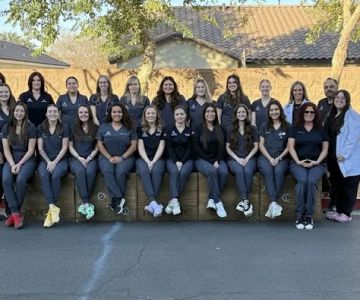How to Become a Veterinary Nutritionist: Your Complete Guide
- 1. Educational Path to Becoming a Veterinary Nutritionist
- 2. Key Skills Needed to Succeed as a Veterinary Nutritionist
- 3. Career Opportunities and Job Outlook for Veterinary Nutritionists
- 4. The Role of Veterinary Nutritionists in Pet Care
- 5. Real-Life Success Stories of Veterinary Nutritionists
- 6. Certification and Licensing for Veterinary Nutritionists
- 7. Further Training and Specializations in Veterinary Nutrition
1. Educational Path to Becoming a Veterinary Nutritionist
Becoming a veterinary nutritionist requires a combination of formal education and practical experience. It’s a rewarding career choice that enables you to help animals achieve optimal health through diet and nutrition. The path to this career typically begins with obtaining a bachelor's degree in animal science, biology, or a related field, followed by a veterinary degree or further specialization in animal nutrition.
The first step is earning a bachelor’s degree. While many veterinary nutritionists hold degrees in animal science or biology, some may opt for a focus in nutrition or even food science. This foundational knowledge is crucial for understanding how nutrition affects animal health, metabolism, and physiology.
After completing an undergraduate program, the next step is pursuing a veterinary degree (DVM or VMD) from an accredited veterinary school. Although a degree in veterinary medicine is not strictly required to work as a veterinary nutritionist, it significantly enhances your credibility and expertise in the field. Many nutritionists in this career path also undergo post-graduate studies to specialize in animal nutrition.

3352 S US Hwy 17 92, Casselberry, FL 32707, USA
See Details2. Key Skills Needed to Succeed as a Veterinary Nutritionist
To excel as a veterinary nutritionist, there are several key skills you must develop. This profession blends scientific knowledge, problem-solving abilities, and a passion for animal welfare. Here are some of the top skills needed to succeed:
Strong Scientific Knowledge
Veterinary nutritionists must have a deep understanding of animal physiology and biochemistry. The role involves analyzing the nutritional needs of animals, from pets to livestock, and recommending tailored diets. Knowledge of vitamins, minerals, protein, fats, and carbohydrates is essential to create balanced, effective nutrition plans for animals.
Analytical Skills
Veterinary nutritionists often work with complex cases that require analyzing an animal’s health and nutritional needs. Whether working with pets suffering from obesity or managing a livestock herd's diet, these professionals need to make informed decisions based on research and animal health data. Strong analytical skills are crucial for diagnosing and offering practical solutions.
Communication and Interpersonal Skills
Veterinary nutritionists must be able to communicate effectively with veterinarians, pet owners, farmers, and other healthcare professionals. Explaining the importance of nutrition and recommending dietary changes requires a clear, empathetic approach. Good communication skills are key when working in collaborative settings and conveying complex information in an understandable way.
3. Career Opportunities and Job Outlook for Veterinary Nutritionists
The demand for veterinary nutritionists is growing, particularly as pet ownership increases and there is greater awareness of animal health. Veterinary nutritionists can work in various environments, including private practices, animal hospitals, food production companies, and research institutions. Some professionals may choose to work independently as consultants, helping pet owners or businesses improve animal nutrition.
The salary for veterinary nutritionists can vary depending on experience, location, and the type of employment. On average, these professionals earn a competitive wage, often between $50,000 and $90,000 per year, with potential for higher earnings based on specialization and seniority. Many professionals find that their salaries increase as they gain more experience and obtain additional certifications.
4. The Role of Veterinary Nutritionists in Pet Care
One of the primary roles of a veterinary nutritionist is to help pets achieve better health through diet. From puppies and kittens to elderly pets, nutrition plays a vital role in an animal's overall well-being. A veterinary nutritionist evaluates the animal's current diet and medical history to develop a custom feeding plan that addresses specific health concerns.
For example, pets with allergies, diabetes, or obesity benefit from specialized diets crafted by a nutritionist. These professionals may also work closely with veterinarians to support pets recovering from illness or surgery. Additionally, some veterinary nutritionists collaborate with pet food companies to develop and test new formulations for pet foods.
5. Real-Life Success Stories of Veterinary Nutritionists
Many veterinary nutritionists have made significant contributions to the field of animal care, helping countless animals live healthier lives. One such example is Dr. Lisa Freeman, a veterinary nutritionist who has worked extensively in pet obesity management. Her research and dietary plans have helped pets shed excess weight, improving their quality of life and extending their lifespan.
Another noteworthy example is Dr. John Smith, a veterinary nutritionist who developed a special diet for older dogs suffering from kidney disease. His work has been instrumental in improving kidney health in pets, reducing the need for medication, and enhancing the dogs' overall health and vitality.
These success stories show how veterinary nutritionists can make a tangible difference in the lives of animals. By focusing on proper nutrition, these professionals are not just helping pets thrive—they’re contributing to the overall betterment of animal health care.
6. Certification and Licensing for Veterinary Nutritionists
In the U.S., obtaining certification is a vital step for becoming a recognized veterinary nutritionist. The American College of Veterinary Nutrition (ACVN) offers board certification for veterinary nutritionists. This certification demonstrates that a professional has met the rigorous standards of education, training, and practical experience required to practice as a veterinary nutritionist.
In addition to ACVN certification, veterinary nutritionists may also consider certification from the National Association of Animal Nutritionists (NAAN). These certifications help professionals stand out in the field, providing credibility and recognition for their expertise.
7. Further Training and Specializations in Veterinary Nutrition
Veterinary nutrition is a constantly evolving field, and continuous learning is key to staying ahead. Many nutritionists pursue further training in specialized areas, such as sports nutrition for animals, exotic animal diets, or food safety in animal nutrition. Continuing education programs, workshops, and conferences provide opportunities to deepen knowledge and keep up-to-date with the latest research and trends in veterinary nutrition.
Some professionals may also pursue academic research roles or collaborate with universities and veterinary schools to teach the next generation of animal health experts. Advanced training not only enhances a veterinary nutritionist's skill set but also opens up new career opportunities and avenues for professional growth.
Conclusion: Embark on a Rewarding Career as a Veterinary Nutritionist
Becoming a veterinary nutritionist is a fulfilling and rewarding career path that combines a passion for animal health with the science of nutrition. By following the right educational route, acquiring the necessary skills, and gaining certifications, you can make a significant impact on the lives of animals and their owners. Whether working with pets, livestock, or wildlife, a career as a veterinary nutritionist offers diverse opportunities and a chance to improve the health and well-being of animals through proper nutrition.
If you're passionate about animals and nutrition, this field may be the perfect fit for you. With the right training, experience, and dedication, you can embark on a successful career as a veterinary nutritionist and contribute to a healthier future for animals everywhere.










